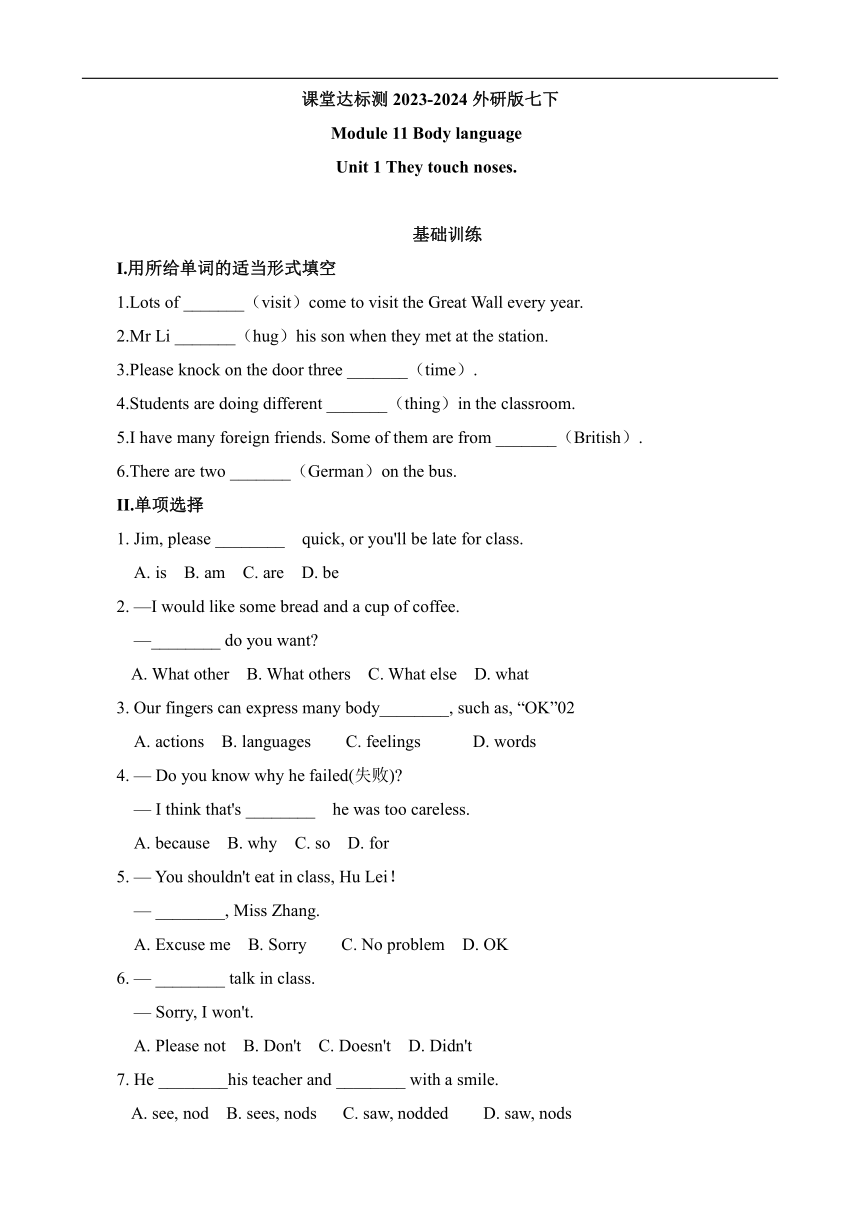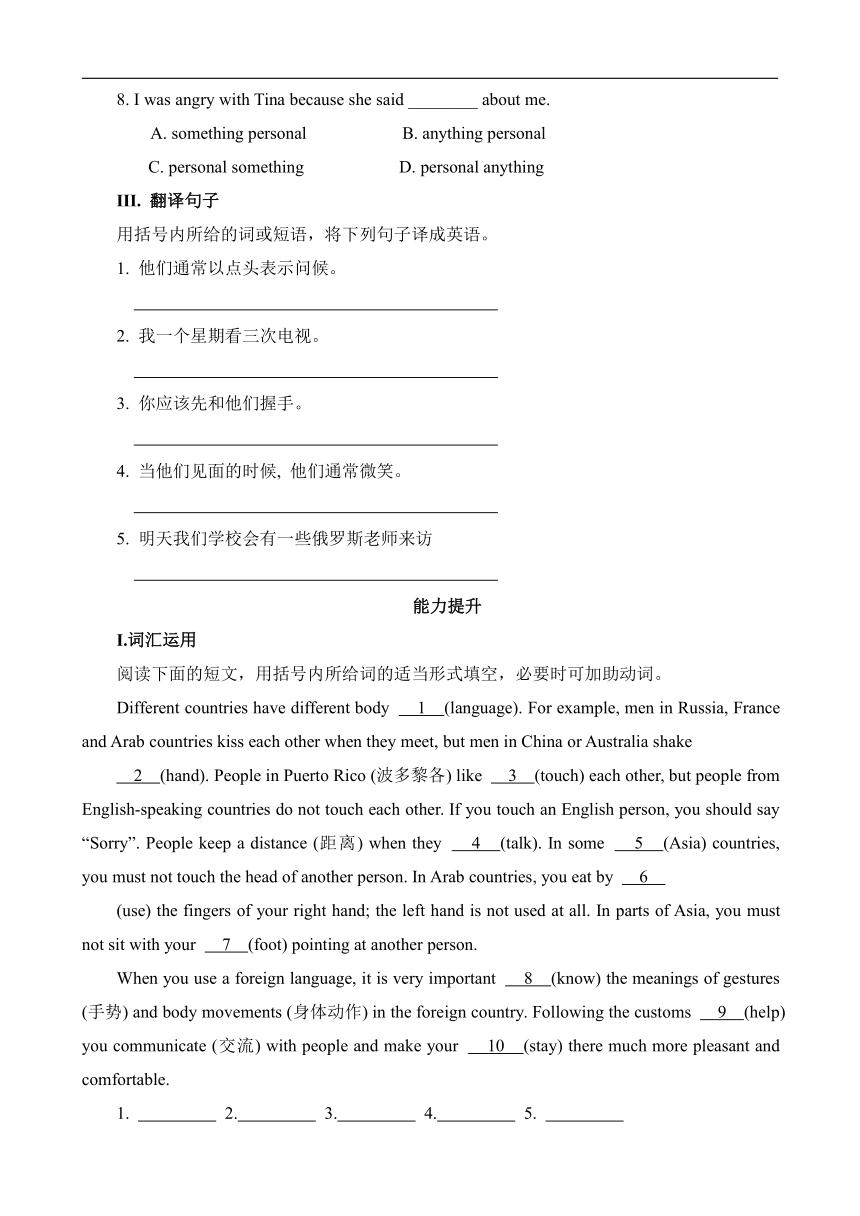Module 11 Unit 1 hey touch noses!课堂达标测(含答案) 2023-2024学年外研版七年级英语下册
文档属性
| 名称 | Module 11 Unit 1 hey touch noses!课堂达标测(含答案) 2023-2024学年外研版七年级英语下册 |

|
|
| 格式 | docx | ||
| 文件大小 | 28.8KB | ||
| 资源类型 | 教案 | ||
| 版本资源 | 外研版 | ||
| 科目 | 英语 | ||
| 更新时间 | 2024-05-13 00:00:00 | ||
图片预览


文档简介
课堂达标测2023-2024外研版七下
Module 11 Body language
Unit 1 They touch noses.
基础训练
I.用所给单词的适当形式填空
1.Lots of _______(visit)come to visit the Great Wall every year.
2.Mr Li _______(hug)his son when they met at the station.
3.Please knock on the door three _______(time).
4.Students are doing different _______(thing)in the classroom.
5.I have many foreign friends. Some of them are from _______(British).
6.There are two _______(German)on the bus.
II.单项选择
1. Jim, please ________ quick, or you'll be late for class.
A. is B. am C. are D. be
2. —I would like some bread and a cup of coffee.
—________ do you want
A. What other B. What others C. What else D. what
3. Our fingers can express many body________, such as, “OK”02
A. actions B. languages C. feelings D. words
4. — Do you know why he failed(失败)
— I think that's ________ he was too careless.
A. because B. why C. so D. for
5. — You shouldn't eat in class, Hu Lei!
— ________, Miss Zhang.
A. Excuse me B. Sorry C. No problem D. OK
6. — ________ talk in class.
— Sorry, I won't.
A. Please not B. Don't C. Doesn't D. Didn't
7. He ________his teacher and ________ with a smile.
A. see, nod B. sees, nods C. saw, nodded D. saw, nods
8. I was angry with Tina because she said ________ about me.
A. something personal B. anything personal
C. personal something D. personal anything
III. 翻译句子
用括号内所给的词或短语,将下列句子译成英语。
1. 他们通常以点头表示问候。
2. 我一个星期看三次电视。
3. 你应该先和他们握手。
4. 当他们见面的时候, 他们通常微笑。
5. 明天我们学校会有一些俄罗斯老师来访
能力提升
I.词汇运用
阅读下面的短文,用括号内所给词的适当形式填空,必要时可加助动词。
Different countries have different body 1 (language). For example, men in Russia, France and Arab countries kiss each other when they meet, but men in China or Australia shake
2 (hand). People in Puerto Rico (波多黎各) like 3 (touch) each other, but people from English-speaking countries do not touch each other. If you touch an English person, you should say “Sorry”. People keep a distance (距离) when they 4 (talk). In some 5 (Asia) countries, you must not touch the head of another person. In Arab countries, you eat by 6
(use) the fingers of your right hand; the left hand is not used at all. In parts of Asia, you must not sit with your 7 (foot) pointing at another person.
When you use a foreign language, it is very important 8 (know) the meanings of gestures (手势) and body movements (身体动作) in the foreign country. Following the customs 9 (help) you communicate (交流) with people and make your 10 (stay) there much more pleasant and comfortable.
1. 2. 3. 4. 5.
6. 7. 8. 9. 10.
II. 短文还原
The meaning of shaking the head is not always the same in different countries. Maybe some visitors would be surprised when they first came to India. 1 The visitors might think that the Indian did not like what they said. But, in fact, they would be completely (完全地) wrong.
2 It does not have the same meaning as “No”. If someone wants to visit India, he should know this, or it will give him some trouble.
One day, a foreign officer went to India on business. He leased(租用) a car and hired (雇用)an Indian to drive it. When he told his driver to send him to his office, the Indian shook his head at once. The officer said again, and the driver shook his head again. At last, the officer, of course, got angry.
“Why do you refuse(拒绝) my order(要求) ” he shouted. “Drive me to my office at once! ”
3 “Yes, sir!” But to the officer’s surprise, the driver shook his head at the same time.
The car started, and the foreign officer was now too surprised to say a word. He thought about it for a while, and then he nodded with a smile, 4
根据短文内容,从下列选项中选出能填入文中空白处的最佳选项,选项中有一项为多余选项。
A. Indians always shake their heads when they talk to each other.
B. “‘No’ means ‘Yes’ here!”
C. Don’t stand too close to each other.
D. The driver answered in quite loud voice, too.
E. When talking to an Indian, he would often shake his head.
参考答案
基础篇
I. 1.visitors 2.hugged 3.times 4.things 5.Britain 6.Germans
II.1—5 DCBAB 6—8BCA
II. 1.They usually greet by nodding their heads.
2. I watch TV three times a week.
3. You should shake hands with them first.
4. They usually smile when they meet.
5. We’re going to have some Russian teachers at school tomorrow.
能力篇
I. 1. languages 2.hands 3. touching 4.are talking 5.Asian 6.using 7.feet 8. To know 9. will help 10. stay
II. 1—4 EADB
Module 11 Body language
Unit 1 They touch noses.
基础训练
I.用所给单词的适当形式填空
1.Lots of _______(visit)come to visit the Great Wall every year.
2.Mr Li _______(hug)his son when they met at the station.
3.Please knock on the door three _______(time).
4.Students are doing different _______(thing)in the classroom.
5.I have many foreign friends. Some of them are from _______(British).
6.There are two _______(German)on the bus.
II.单项选择
1. Jim, please ________ quick, or you'll be late for class.
A. is B. am C. are D. be
2. —I would like some bread and a cup of coffee.
—________ do you want
A. What other B. What others C. What else D. what
3. Our fingers can express many body________, such as, “OK”02
A. actions B. languages C. feelings D. words
4. — Do you know why he failed(失败)
— I think that's ________ he was too careless.
A. because B. why C. so D. for
5. — You shouldn't eat in class, Hu Lei!
— ________, Miss Zhang.
A. Excuse me B. Sorry C. No problem D. OK
6. — ________ talk in class.
— Sorry, I won't.
A. Please not B. Don't C. Doesn't D. Didn't
7. He ________his teacher and ________ with a smile.
A. see, nod B. sees, nods C. saw, nodded D. saw, nods
8. I was angry with Tina because she said ________ about me.
A. something personal B. anything personal
C. personal something D. personal anything
III. 翻译句子
用括号内所给的词或短语,将下列句子译成英语。
1. 他们通常以点头表示问候。
2. 我一个星期看三次电视。
3. 你应该先和他们握手。
4. 当他们见面的时候, 他们通常微笑。
5. 明天我们学校会有一些俄罗斯老师来访
能力提升
I.词汇运用
阅读下面的短文,用括号内所给词的适当形式填空,必要时可加助动词。
Different countries have different body 1 (language). For example, men in Russia, France and Arab countries kiss each other when they meet, but men in China or Australia shake
2 (hand). People in Puerto Rico (波多黎各) like 3 (touch) each other, but people from English-speaking countries do not touch each other. If you touch an English person, you should say “Sorry”. People keep a distance (距离) when they 4 (talk). In some 5 (Asia) countries, you must not touch the head of another person. In Arab countries, you eat by 6
(use) the fingers of your right hand; the left hand is not used at all. In parts of Asia, you must not sit with your 7 (foot) pointing at another person.
When you use a foreign language, it is very important 8 (know) the meanings of gestures (手势) and body movements (身体动作) in the foreign country. Following the customs 9 (help) you communicate (交流) with people and make your 10 (stay) there much more pleasant and comfortable.
1. 2. 3. 4. 5.
6. 7. 8. 9. 10.
II. 短文还原
The meaning of shaking the head is not always the same in different countries. Maybe some visitors would be surprised when they first came to India. 1 The visitors might think that the Indian did not like what they said. But, in fact, they would be completely (完全地) wrong.
2 It does not have the same meaning as “No”. If someone wants to visit India, he should know this, or it will give him some trouble.
One day, a foreign officer went to India on business. He leased(租用) a car and hired (雇用)an Indian to drive it. When he told his driver to send him to his office, the Indian shook his head at once. The officer said again, and the driver shook his head again. At last, the officer, of course, got angry.
“Why do you refuse(拒绝) my order(要求) ” he shouted. “Drive me to my office at once! ”
3 “Yes, sir!” But to the officer’s surprise, the driver shook his head at the same time.
The car started, and the foreign officer was now too surprised to say a word. He thought about it for a while, and then he nodded with a smile, 4
根据短文内容,从下列选项中选出能填入文中空白处的最佳选项,选项中有一项为多余选项。
A. Indians always shake their heads when they talk to each other.
B. “‘No’ means ‘Yes’ here!”
C. Don’t stand too close to each other.
D. The driver answered in quite loud voice, too.
E. When talking to an Indian, he would often shake his head.
参考答案
基础篇
I. 1.visitors 2.hugged 3.times 4.things 5.Britain 6.Germans
II.1—5 DCBAB 6—8BCA
II. 1.They usually greet by nodding their heads.
2. I watch TV three times a week.
3. You should shake hands with them first.
4. They usually smile when they meet.
5. We’re going to have some Russian teachers at school tomorrow.
能力篇
I. 1. languages 2.hands 3. touching 4.are talking 5.Asian 6.using 7.feet 8. To know 9. will help 10. stay
II. 1—4 EADB
同课章节目录
- Module 1 Lost and found
- Unit 1 Whose bag is this?
- Unit 2 Are they yours?
- Unit 3 Language in use
- Module 2 What can you do ?
- Unit 1 I can play the piano
- Unit 2 I can run really fast
- Unit 3 Language in use
- Module 3 Making plans
- Unit 1 What are you going to do at the weekends?
- Unit 2 We're going to cheer the players.
- Unit 3 Language in use
- Module 4 Life in the future
- Unit 1 Everyone will study at home
- Unit 2 Every family will have a small plane.
- Unit 3 Language in use
- Module 5 Shopping
- Unit 1 What can I do for you?
- Unit 2 You can buy everything on the Internet
- Unit 3 Language in use
- Module 6 Around town
- Unit 1 Could you tell me how to get to the Nationa
- Unit 2 The London Eye is on your right.
- Unit 3 Language in use
- Revision module A
- Module 7 My past life
- Unit 1 I was born in a small village.
- Unit 2 I was born in Quincy.
- Unit 3 Language in use
- Module 8 Story time
- Unit 1 Once upon a time….
- Unit 2 Goldilocks hurried out of the house.
- Unit 3 Language in use
- Module 9 Life history
- Unit 1 He left school and began work at the age of
- Unit 2 He decided to be an actor.
- Unit 3 Language in use
- Module 10 A holiday journey
- Unit 1 What did you do?
- Unit 2 This morning we took a walk.
- Unit 3 Language in use
- Module 11 Body language
- Unit 1 They touch noses!
- Unit 2 Here are some ways to welcome them.
- Unit 3 Language in use
- Module 12 Western music
- Unit 1 It's so beautiful!
- Unit 2 Vienna is the centre of European classical
- Unit 3 Language in use
- Revision module B
